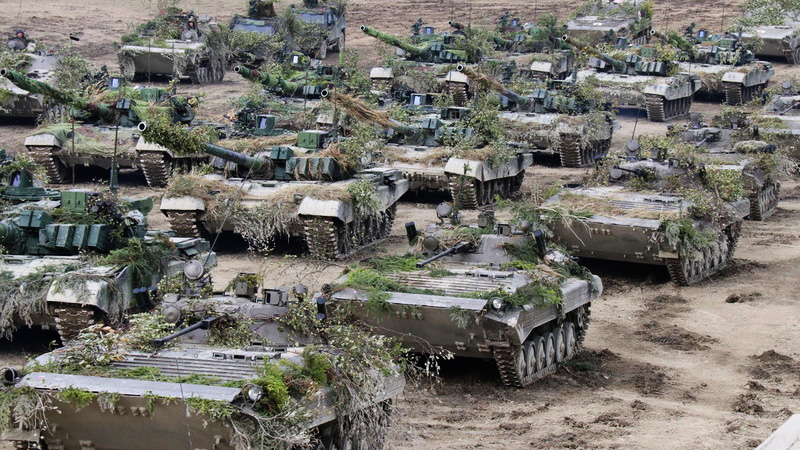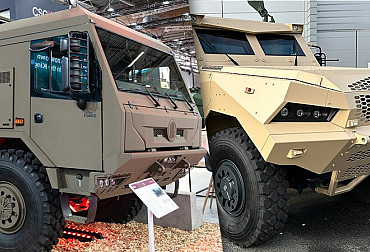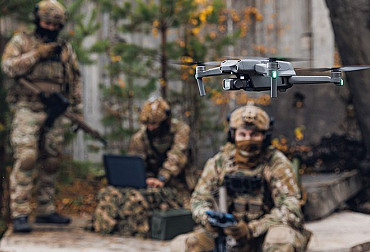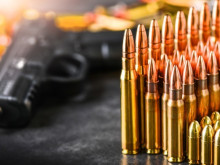The end of cheap security
The war in Ukraine represents the biggest transformation of the security environment since the end of the Cold War. Unfortunately, there is still a prevailing opinion in part of our society that the Czech Republic is not in danger because we are part of the North Atlantic Alliance and "someone" will protect us eventually. According to this part of society, the capabilities of the Czech Armed Forces should be adapted to this and no significant financial resources should be invested in them or in their modernisation, as 'there is no need'.
First of all, it should be noted that defence and security is a basic function of every state, including the Czech Republic. This function cannot be abandoned even in the case of the Czech Republic's membership of the North Atlantic Treaty Organisation, which also obliges us to help other Member States. In addition, the war in Ukraine proves that conflicts have not disappeared from the world with a wave of a magic wand and can come very close to our borders. Arguments that 'there will never be war in Europe again because we can get along with everyone' or that 'economic cooperation and trade links will solve all conflicts' are thus completely misguided.
 Picture: To many people, spending tens of billions of crowns on the modernisation of the Czech Armed Forces may seem unnecessary, but let us remember that security is simply and simply paid for, and the era when we as Europeans enjoyed unprecedented economic growth with relatively little investment in defence is over. (illustration photo) | Ministry of Defence of the Czech Republic
Picture: To many people, spending tens of billions of crowns on the modernisation of the Czech Armed Forces may seem unnecessary, but let us remember that security is simply and simply paid for, and the era when we as Europeans enjoyed unprecedented economic growth with relatively little investment in defence is over. (illustration photo) | Ministry of Defence of the Czech Republic
In the current situation, with the United States concentrating on its rivalry with the People's Republic of China (PRC) in the Indo-Pacific region, it is necessary for all European states to stop relying on the Americans to handle and resolve everything in the event of a major inter-state conflict in Europe. A typical example of this alibi-like thinking is the call for the enforcement of a no-fly zone in Ukraine. In principle, the only member of the Alliance that has all the necessary capabilities to do this is the United States.
European Member States, including the Czech Republic, should therefore, not only in the context of the shift of American attention and capabilities towards the PRC, accelerate their defence spending above the minimum threshold of 2% of GDP so as to make up for the possible lack of American forces and assets in Europe and be able to defend the other Alliance Member States. In this context, in the case of the Czech Republic, it is no longer possible to argue alibistically that 'we are a small country, we cannot afford it, and therefore we should focus on developing specialised units and abandon dreams of a fighting and powerful army'.
A typical example of completely alibi-like thinking is, for example, the opinion that our army does not need expensive modern supersonic aircraft (and it does not matter whether it is the F-35, Gripen E or other machines). No one can now estimate what situation the Czech Armed Forces may get into in the future, for example in the defence of the Baltic States, and what supersonic capabilities will be needed for this activity, but it is clear that modern, well-equipped machines will be needed that will be able to communicate or cooperate seamlessly with our and allied equipment.
It is the same with the ground combat equipment of the Czech Armed Forces (tracked IFVs, wheeled IFVs, tanks, self-propelled howitzers, etc.) or medium-range air defence equipment, which is currently often in a deplorable state and its modernisation, even if it will be financially demanding, is simply necessary. Thus, the arguments that, for example, we do not need new tanks or that we do not need a tank army as such or that there is no need to acquire modern medium-range air defence complexes do not hold water. Our Army simply needs to retain these capabilities, and the current obsolete technology already threatens this fact.
Thus, many people may feel that spending tens of billions of crowns on the modernisation of the Armed Forces is unnecessary, but let us remember that security is simply and simply paid for, and the era when we as Europeans enjoyed unprecedented economic growth with relatively little investment in defence is over. So 2% of GDP on defence should be the minimum. Our security has been and continues to be guaranteed by the United States, but given the aforementioned rivalry with the PRC, it is not certain how long they will maintain the relevant capabilities in Europe to guarantee European security. The PRC was confirmed as a priority for US foreign policy at the end of May this year by US Secretary of State Anthony Blinken. He was followed by US Secretary of Defense Lloyd Austin, who in a speech during the Shangri-La Dialogue in June this year identified the Indo-Pacific as a priority theatre of war for the United States. The sooner we as Europeans realise this and start investing in our own defence and security, the less surprised we will be in the future. To illustrate this perspective, it would be useful to imagine how Czech taxpayers would feel if the Czech Republic were to make a significant contribution to the defence of another state that had not paid attention to its own defence and security investments for a long time, which is the case of the Czech Republic. The Czech Army carries with it a multi-billion internal debt (estimated at CZK 300-400 billion), and this is clearly visible in its armaments.
One of the most well-known security conferences held in the Czech Republic is called "Our Security is not a given" and our security is indeed not a given, although part of our society takes security and the fact that there is no war on Czech territory or in its close vicinity for granted. So it is quite right that we try to fulfil our commitments to the Alliance, to invest in our defence and to develop the capabilities of our army. After all, following the invasion of Ukraine by Russian troops, a number of NATO Member States have recognised the need to significantly expand and modernise their militaries in order to be as defensible as possible, and this should be an inspiration to us.
In addition to foreign products, let us also make use of the capabilities and capacities of the relevant players in the domestic defence industry and, as part of strengthening the capabilities of the Czech Armed Forces, let us support the Czech economy. Let us not use alibi-like excuses, as the lack of investment in the event of an inter-state conflict will not replace real capabilities. Let us together take the defence and security of the Czech Republic seriously to the extent that other allies within the Alliance will be able to rely on us.





















